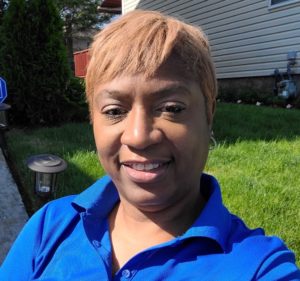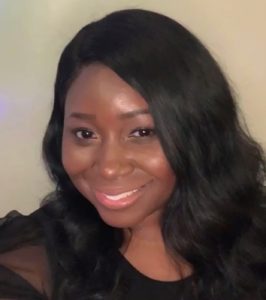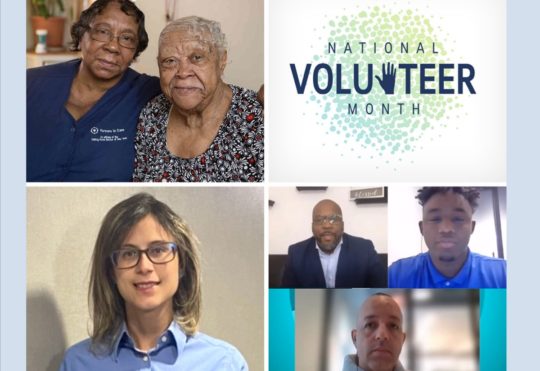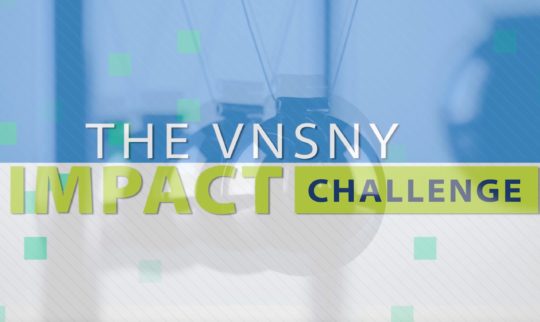Meet This Year’s Liota and Marren Award Winners!
As part of VNSNY’s ongoing Nurses Month celebration, the 2021 Liota and Marren Award winners have just been announced. Congratulations to the honorees, Collette Hendricks and Tameka McCabe, who were nominated by their VNSNY colleagues and selected by a committee of nursing leaders!
Collette Hendricks, Psychiatric Nurse, Winner of the Marilyn Liota Award
The Liota Award to Promote Cultural Diversity in Nursing Leadership, named after long-time VNSNY nurse and Queens Regional Vice President Marilyn Liota, is awarded each year to help an exemplary VNSNY nurse realize her or his leadership potential. The award provides a $1,500 scholarship for expenses related to nursing studies, continuing professional development, or communication/English language skills development.
 “I’ve always had compassion for people with mental illness.”
“I’ve always had compassion for people with mental illness.”
Very early on during the COVID pandemic, when Zoom meetings were being held about pivoting to remote patient care during lockdown, Collette wouldn’t hear of it. “What’s going to happen to my clients if I’m not going out in the field?” was her response. Collette, a psychiatric nurse with the Queens Assertive Community Treatment (ACT) team, was scared but determined. With the help of management, she was able to secure the necessary PPE (no easy task in those early days) and headed out to see her clients.
“Most of the people I treat have a psychiatric disorder—mainly schizophrenia, schizoaffective disorder, or bipolar—and they need their visits and their meds,” says Collette. “Without care, they tend to rapidly cycle in and out of hospitals, which were already overflowing in those days.” Collette’s role on her ACT team, which is part of VNSNY’s Community Mental Health Services, is to keep her clients, and their communities, safe. “Twice a week, we bring a full-service hospital to them,” she explains, “including medications, injections, and social services.”
Collette feels she was destined to work in mental health. “Even before I was a nurse, people have always gravitated to me for support” she says. “I’ve always had compassion for people with mental illness, even before I was aware of exactly what it was. I have an uncle who’s a schizophrenic, and I grew up with a close friend who was bipolar and who ultimately attempted suicide. I was always a go-to person when it came to helping them, and I’m sure that they inspired me to become part of the solution with my choice of career.”
Collette has also helped organize mental-health symposiums featuring panels on the psychiatric issues and various therapies—pharmaceutical and otherwise—that are used to treat the culturally diverse population her team serves. “There is a lot of stigma surrounding mental illness, and it needs to be discussed,” she notes. “I also encourage people on my panel who have gotten treatment to speak about how their treatment worked for them.”
Collette has been a nurse since 2001 and a psychiatric nurse since 2007. She has been with VNSNY for a little over four years now, and had no idea that she had been nominated for the Liota Award. “It’s such an exciting opportunity,” she says. “I’m still determining exactly how I’m going to use the scholarship money, but it will definitely go to furthering my commitment to mental health.”
Tameka McCabe, Clinical Intake Manager, Winner of the Joan Marren Award
The Marren Leadership Award to Promote Evidence-Based Practice & Quality Improvement, named for Joan Marren, former VNSNY Chief Operating Officer and President of VNSNY Home Care, provides a $1,000 scholarship per year of study for a master’s degree in nursing or other nursing-related advanced degree. The award can be put toward school-related expenses not covered under VNSNY’s Tuition Reimbursement Program.
 “Working at VNSNY really helped shape my career. It gave me the opportunity to see the impact that nurses make in the lives of the patient population that we serve.”
“Working at VNSNY really helped shape my career. It gave me the opportunity to see the impact that nurses make in the lives of the patient population that we serve.”
As a Clinical Intake Manager for VNSNY Home Care, Tameka ensures that patients have a smooth transition of care when moving from a hospital or other clinical setting to their homes. “I work with my team to make sure they are collaborating with the referral source so that each client gets an appropriate, safe discharge plan when they leave a hospital, nursing home, or rehab facility,” she explains. “We want to make sure they will be safe in their community and that they’re provided with the critical resources needed to prevent their rehospitalization. I also see myself as a resource for my team—someone they can discuss clinically complex cases with, and who can provide support and guidance when needed.”
Intake is a complex balancing act that requires coordination between the referral source and VNSNY’s operational staff. Every case is different, notes Tameka, with its own nuances and complexities. In addition, the pandemic has added its own twists to this process. “Prior to the pandemic, Intake worked on-site,” she says. “As result of the pandemic we had the challenge of working remotely. This entailed really working hard to further strengthen the relationships with our healthcare partners virtually as well as telephonically. And since we were no longer patient-facing, this also meant we had to use a lot of critical thinking to ensure the safety of our patients and develop their transition-of-care plans through an extensive review of the patient’s electronic medical record and telephonic assessments.”
A consistent focus for Tameka has involved working to reduce hospital readmissions for her patient population. Working in collaboration with VNSNY’s Operations and Quality teams, she developed a sophisticated risk-for-hospitalization screening tool which identifies those patients who are at highest risk for rehospitalization. “This was part of my practicum experience,” she says, “for which I got a lot of support from my preceptor, Catherine Schaefer, director of Quality Management Services, who was a real mentor to me.”
A 15-year VNSNY veteran, Tameka has held positions across the organization. “I originally applied to VNSNY because I knew I wanted to work in health care,” she recalls. “I started out as a fundraising and marketing coordinator for the Development office, then became a senior development associate while I was pursuing my associate’s degree in nursing.”
Once she became a nurse, Tameka worked as a field clinician for six years, then managed a Home Care interdiscipiinary care team as a Clinical Field Manager before transitioning to her current role. “Experiencing so many different departments at VNSNY has provided me with a very well-rounded understanding of the organization as a whole,” she says. “Working in Development enhanced and honed my communication skills. My nursing education then gave me a great clinical foundation that I solidified with hands-on experience as a field clinician. Being a clinical field manager—in which I was managing nurses, PTs, OTs, and SWs in the field—started me out on a leadership path, and my current role lets me interact with clinical and nonclinical staff and hospital referral partners.” She is now looking into pursuing a certificate program to enhance her master’s degree in nursing, adds Tameka—possibly in policy. “I’m excited to learn more!”

